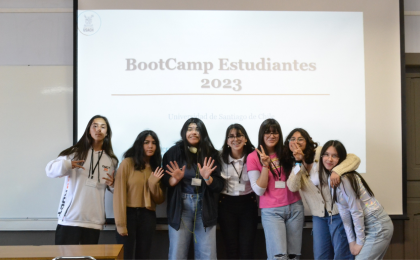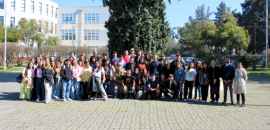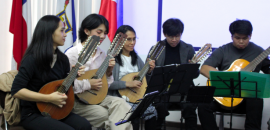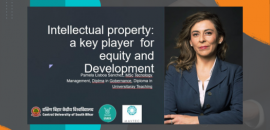- Español
- English
You are here
United Nations Highlights USACH Program Aimed at Strengthening Women's Participation in STEM Areas

Through the United Nations Academic Impact (UNAI) initiative, managed for our Institution by the Department of International Relations, the UN highlighted a USACH program that aims to provide tools in science, technology, engineering, and mathematics to teachers in educational institutions in Chile.
United Nations Academic Impact (UNAI) is an initiative that seeks to align higher education institutions with the United Nations. Through the management of the Department of International Relations, the University of Santiago, Chile, has been part of UNAI since 2022, considering that it is a network that allows working in alignment with the Institutional Strategic Plan and the commitment to direct university activities towards the challenges posed by the 2030 Agenda.
It is in this context that the UN recently highlighted an initiative driven by USACH, more specifically by professors Carolina Bonacic Castro and Héctor Muñoz Romero from the Faculty of Engineering, who have implemented gender-focused STEM academies in five schools across the country through the VIME Fund: Colegio San Andrés, Colegio Ajial, Liceo Polivalente Eugenio Pereira Salas, Liceo Abdón Cifuentes, and Colegio New Buckingham.
The project leader, Carolina Bonacic Castro, commented to the portal Ciencia En Chile that the specific objective is “to provide the necessary tools to the teachers of the educational institutions so that they can deliver technology, knowledge, and innovation to their scientific projects in the classrooms.”
That is why UNAI published on its website the article “Training Teachers on STEM Education: The Initiative of a Chilean University,” highlighting the relevance of incorporating a gender perspective in this initiative, considering the data available on the subject in the document “Exploring STEM Competences for the 21st Century,” which states that ensuring girls and women have equal access to STEM education and ultimately STEM careers is imperative from the perspectives of human rights, science, and development.
The article published on the United Nations website also notes that the project, which is supported by the Vice-Rectory of Public Engagement and Outreach and various faculties and departments, aims to train teachers, mainly from secondary education, to implement the so-called “STEM Academies.” To achieve this, they are allowed to address educational projects with a STEM focus and a unique interdisciplinary angle.
In 2023 alone, more than two dozen teachers from different regions of Chile were trained, coming from the Metropolitan Region, Chiloé, Concepción, and Iquique. The group is composed of a wide range of professionals from different fields who have worked in teams to design innovation activities focused on improving their environment, using technological tools and drawing inspiration from the 2030 Agenda for Sustainable Development.
One of the most significant projects was developed in Quemchi (Chiloé), where teachers built a weather station where students can make real-time measurements of humidity and ambient temperature. To carry out these measurements, field trips to native forests were conducted. Additionally, a group of eighth-grade students taught younger students how to work at the weather station. Like this, many other projects were implemented as part of the “STEM Academies” project during 2023 and will continue into part of 2024.
News
 International students learn cueca with Usach Without Borders and Department of Cultures and Arts
International students learn cueca with Usach Without Borders and Department of Cultures and Arts
12 Sep 2024
 Rector Vidal to join the Governing Board of UNESCO's International Institute for Higher Education
Rector Vidal to join the Governing Board of UNESCO's International Institute for Higher Education
2 Sep 2024
 Students visited the Ambassador of Morocco to learn about the country's diplomatic work and culture
Students visited the Ambassador of Morocco to learn about the country's diplomatic work and culture
25 Jul 2024



